SCBC holds the 2021 Annual Academic Conference on Airport Economy
On November 13, the 2021 Annual Academic Conference of the Collaborative Innovation Center for Airport Economy was held at the International Conference Hall, with the theme of High Quality Development of Airport Economy in Guangdong, Hong Kong and Macao Bay Area under the New Development Pattern of “Dual Circulation. The conference was held both online and offline, where renowned experts and scholars from colleges and universities and the airport industry gathered to discuss new paths and new thoughts on the high-quality development of the airport economy under the dual-circulation development pattern in the new era. The conference was presided by Supervisor General Gu Yeli.
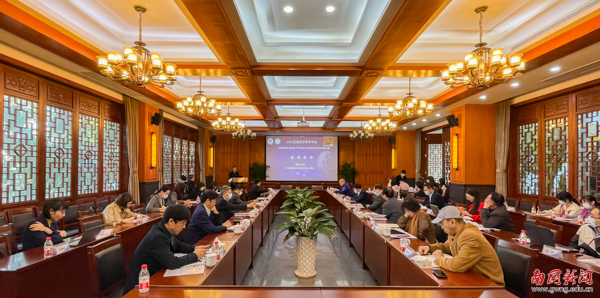
Wang Hua, executive president of South China Business College of Guangdong University of Foreign Studies, Zheng Hongjun, director of Social Science Planning Office of Guangdong Social Sciences Association, and Xie Dewen, deputy director of Economic Development of Airport Economy Committee and deputy chief of the Finance Bureau of Guangzhou, attended the opening ceremony and delivered speeches respectively. Chair of the Board Ding Xiaojun, Supervisor General Gu Yeli, and Vice President He Aibing were present at the conference. Members of the academic committee of the Collaborative Innovation Center for Airport Economy, full-time and part-time researchers, authors who submitted papers to the annual conference, and well-known scholars from higher education institutions such as University of International Business and Economics, Guangdong University of Foreign Studies, South China Normal University and Jinan University also joint the occasion.

Executive President Wang Hua said in his speech that at present, the nine cities and two regions in the Guangdong-Hong Kong-Macao Greater Bay Area are striving to take off, following the guidelines from the new development pattern of dual circulation, with airport economy as an important air gateway for the further opening up of the Greater Bay Area. At this important historical juncture, how to nurture new opportunities under the new development pattern of dual circulation in the Guangdong-Hong Kong-Macao Greater Bay Area through the development of airport economy, how to carve a new path that attracts more innovative elements, and how to create a new chapter in the promotion of high-quality economic development have become issues of great importance and hence the theme for this annual academic conference.
Wang Hua hoped that SCBC’s Collaborative Innovation Center for Airport Economy should grasp the important opportunity of the development of Guangdong-Hong Kong-Macao Greater Bay Area, enhance the understanding of the development of airport construction and the layout of general aviation industry in the Greater Bay Area, and dig deep into the potentials of aviation economy and collaborative innovation in airport economy. They should spare no efforts to serve the national strategy, making breakthroughs at both ends with cutting-edge theoretical research and high quality social services and striving to make greater achievements and contributions. Only with these results should they truly become a think tank that can contributes to government decision-making, industrial transformation, and the collaborative innovation of government, universities, and enterprises.
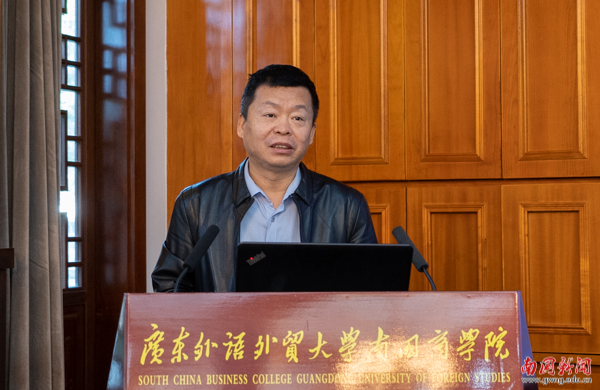
Zheng Hongjun delivered a speech on behalf of Guangdong Social Sciences Association. He said that Guangdong Social Sciences Association, as a bridge that links the provincial government and the social science theorists, will continue to support the work of SCBC”s Collaborative Innovation Center for Airport Economy and encourage philosophers and scholars of social science to offer their wisdom.
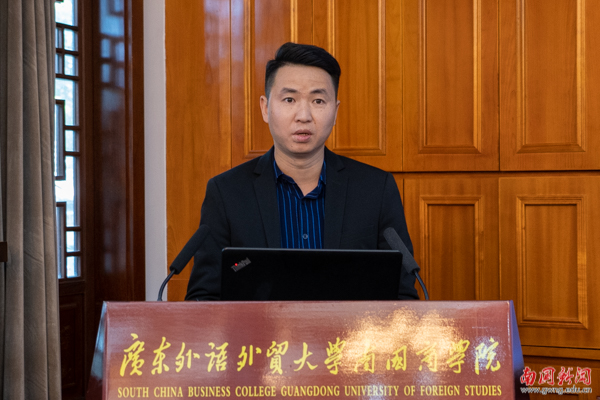
Xie Dewen delivered a speech on behalf of Guangzhou Airport Economy Committee. He said that as Guangzhou is accelerating the development of airport economy, the Annual Academic Conference on Airport Economy held by South China Business College to discuss important issues about Airport Economy in the Guangdong-Hong Kong-Macao Greater Bay Area has provided a great opportunity for exchange of ideas in the area. This will help promote cooperation between government, universities, industry and enterprises in the Greater Bay Area, leading to useful ideas and propositions for deepening communication and mutually beneficial collaboration, which will help blaze new paths and spark new thoughts for the high-quality development of airport economy.
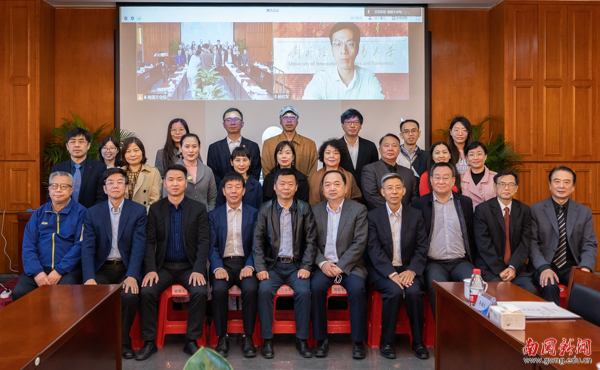
In the session of first keynote speech after the opening ceremony, six experts and scholars gave their opinions on High-quality development of the airport economy in the Guangdong-Hong Kong-Macao Greater Bay Area under the new development pattern of dual circulation.
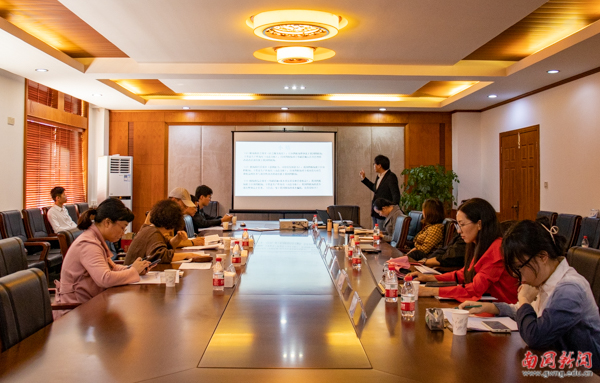
In the afternoon, the second session of the conference was held in Room 309 of the Administration Building. Twelve authors whose papers were selected for the annual conference exchanged ideas on such topics as Synergistic Development of Small and Medium Airports and Hub Airports in Guangdong-Hong Kong-Macao Greater Bay Area, High Quality Development of Innovation and Industry Chains in Guangdong-Hong Kong-Macao Greater Bay Area under the New Development Pattern , Airport Efficiency, Synergistic Development of Airports in Guangdong, Zhuhai and Macao and Development of Airport Industry. The session was moderated by Wu Xinling, director of SCBC’s Research Office. Prof. Li Tiecheng from the School of Tourism and Prof. Zheng Jingshu from the School of Economics served as reviewers and made comments and suggestions for revision on the research topics and contents, the research methodology, and the structure of argumentation.
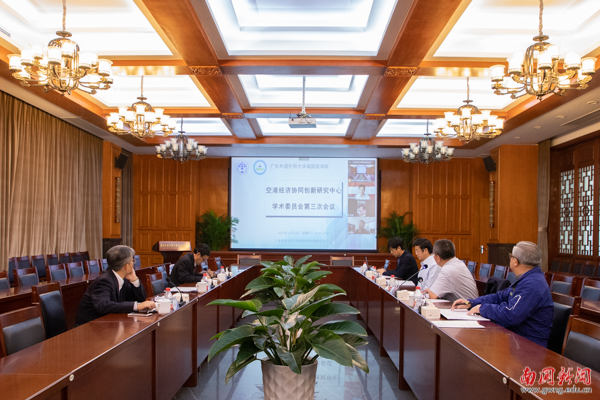
The third meeting of the Academic Committee of the Collaborative Innovation Center for Airport Economy was held simultaneously at the International Conference Hall. The meeting listened to the report of Qi Ruifu, executive director of the Collaborative Innovation Center for Airport Economy, on the summary of the work of the Center in 2021 and the key work plan of the Center in 2022. The members of the Academic Committee who attended either online or offline deliberated the key work plan of the Center in 2022 and put forward constructive suggestions.